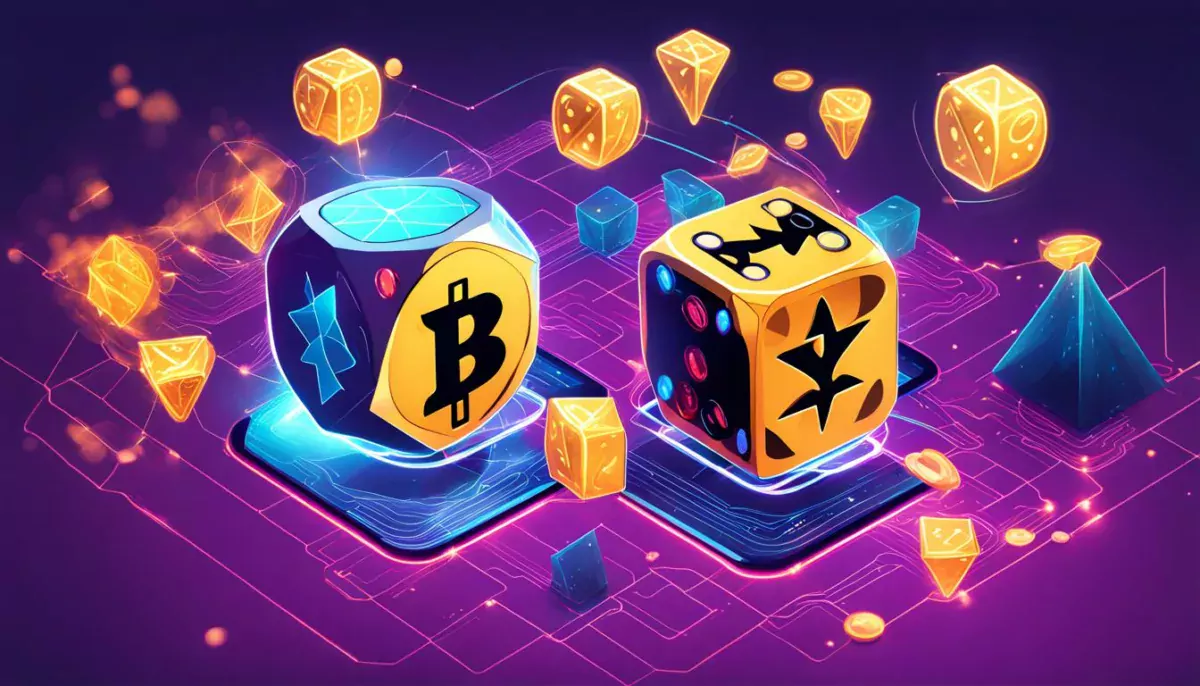
Introduction to Decentralized Betting
What is Decentralized Betting? A Comprehensive Overview
Decentralized betting represents a paradigm shift from traditional online betting platforms controlled by a central authority to a new era of betting platforms operated and regulated by consensus algorithms on a blockchain. This model eliminates the need for a central authority, thus providing a transparent, immutable, and fair betting environment.
Why Trustworthy Verification in Decentralized Betting is Crucial
The essence of trustworthy verification in decentralized betting cannot be overstated. It is the bedrock of fairness and transparency which are crucial for player trust and the overall success of the platform.
Quote: Expert Opinions on the Importance of Decentralized Betting
“Blockchain has revolutionized the financial industry through the utilization of cryptocurrencies using decentralized control… extending Blockchain to span several other industries and applications for its capabilities in verification,” notes a recent study on blockchain for internet decentralization (source).
Key Takeaways from the Introduction
- Decentralized betting platforms operate on a blockchain, ensuring transparency and fairness.
- Trustworthy verification is essential for maintaining player trust and platform integrity.
- Blockchain’s verification capabilities extend beyond financial applications, highlighting its potential in revolutionizing the online betting industry.
Decentralized Betting Mechanics Explained
How Does Decentralized Betting Operate? A Detailed Guide
Decentralized betting operates on a peer-to-peer network, uncontrolled by a central authority. This setup heavily relies on blockchain technology, ensuring transactions are secure, transparent, and immutable. The decentralized nature facilitates the alignment of incentives among participants, something traditionally achieved by centralized control.
Smart Contracts in Decentralized Betting: An In-Depth Analysis
Smart contracts are the linchpin in decentralized betting platforms. These self-executing contracts have the terms of the agreement coded directly into them, automating the betting and payout processes without the need for intermediaries. They exert control over assets digitally recorded on a blockchain, with the data that triggers execution being internal to the blockchain protocol.
Creation and Deployment
Smart contracts begin with an agreement between parties on terms and conditions. They are then translated into code by developers and deployed to the blockchain, becoming immutable and irreversible once live.
Triggering Conditions
The execution of smart contracts relies on predefined conditions being met. In the context of betting, this could be the conclusion of a sporting event.
Execution
Once the triggering conditions are satisfied, the smart contract automatically executes the terms of the contract, such as transferring winnings to the appropriate parties.
How Smart Contracts Work in Decentralized Betting
You can view this diagram in a new tab.
The flow diagram visually encapsulates the process of how smart contracts function in the realm of decentralized betting. From the moment a user places a bet, the smart contract takes over, verifying the bet through the blockchain. Once the outcome is determined, the smart contract either distributes the winnings or refunds the bet, ensuring a transparent and secure betting experience.
How To: Steps to Understand Decentralized Betting Mechanics
- Educate Yourself: Familiarize yourself with blockchain technology and smart contracts. Understanding the basics will provide a solid foundation for grasping decentralized betting mechanics.
- Explore DApps: Explore various decentralized betting platforms and observe how they implement smart contracts to handle bets.
- Engage in Communities: Join forums and communities centered around blockchain betting to learn from others’ experiences and gain insights into best practices.
- Test the Waters: If permissible by law, consider placing small bets on decentralized platforms to understand the process better. Hands-on experience can provide invaluable insights.
- Stay Updated: The world of decentralized betting is rapidly evolving. Stay updated with the latest developments to understand how emerging technologies continue to shape the landscape.

Oracle Technology and Transparency in Decentralized Betting
How Oracles Ensure Fair Play in Decentralized Betting Verification
Oracles play a pivotal role in decentralized betting by serving as bridges between blockchain networks and the external world. They provide smart contracts with external data, enabling these agreements to trigger their coded conditions based on real-world outcomes. A notable aspect of ensuring fair play is the provision of a provably fair source of randomness, which is indispensable for organizations aiming to uphold a level of public verification rather than merely soliciting trust and goodwill from their users, according to Supra Oracles. Through decentralized oracle networks like Chainlink, smart contracts on any blockchain can access a plethora of off-chain resources, such as tamper-proof price data and verifiable randomness, crucial for maintaining integrity and fairness in decentralized betting platforms.
The Critical Role of Transparency: Open-Source Codes and Public Ledgers
Transparency is the cornerstone of trust in decentralized betting platforms. Employing open-source codes and public ledgers allows anyone to verify the rules and the outcomes of the bets. The transparency inherent in blockchain technology ensures that every transaction and bet is recorded and verifiable by all participants, minimizing the chances of fraud and manipulation.
The Role of Oracles in Bet Verification
You can view this diagram in a new tab.
This state diagram illustrates the intricate role that oracles play in the verification of bets in decentralized betting platforms. The process begins with a request received from the user, which then moves to the Oracle Verification stage. Within this stage, the oracle goes through a series of sub-steps: Data Collection, Data Validation, and Data Submission. Once the oracle has verified the outcome, the system either distributes the winnings or refunds the bet, depending on the outcome determined.
The diagram serves as a visual guide to understanding the complex mechanisms behind bet verification in decentralized systems. It’s an invaluable resource for anyone looking to grasp the nuances of how oracles contribute to the integrity and functionality of decentralized betting platforms.
Table: Types of Data Provided by Oracles
| Data Type | Description | Example Use in Betting |
|---|---|---|
| Event Outcomes | Providing results of real-world events | Determining the winner of a race |
| Price Feeds | Delivering up-to-date price information | Updating betting odds in real-time |
| Randomness | Generating random numbers or data | Drawing a lottery number |
| Computation | Performing complex computations off-chain | Calculating betting payouts |
The integration of oracle technology, coupled with the transparency afforded by open-source codes and public ledgers, significantly elevates the trust and fairness level in decentralized betting platforms. By openly showcasing the rules and providing verifiable, unbiased data through oracles, these platforms promise a level playing field for all participants, thereby revolutionizing the traditional betting landscape.
Expert Testimonials on Decentralized Betting Safety
Is Decentralized Betting Secure? Expert Opinions Unveiled
Delving into the core of decentralized betting, Adriaan Brink, CEO of FUN Token, elucidates that decentralization fundamentally slashes the custodial facet prevalent in online gaming. By crafting avenues for players to link their cryptocurrency wallets directly to the operator’s platform, a veil of control shrouds the players’ funds, invariably heightening the security landscape.
Nick Kelland, the Head of Growth at Betswap.gg, brings to light the modern narrative of sports betting metamorphosing into a decentralized avatar. This shift not only democratizes the betting arena but also instills a higher degree of security, embodying a robust challenge to traditional betting paradigms.
The security narrative further unfurls as we tread into the domain of blockchain, the bedrock of decentralized betting. The technology lays down a framework of transparency, security, and fair play, which are pivotal in revolutionizing the sports betting industry.
Industry Leader Insights on the Benefits of Decentralized Betting Platforms
The tapestry of benefits sewn by decentralized betting platforms is rich and varied. One of the stellar advantages is the prompt payout mechanism. Dexsport, for instance, pioneers in facilitating instant payouts to winners through a shared liquidity pool. This decentralized model ensures that the rightful winnings reach the users promptly, thereby eliminating any room for payment withholding.
Expert Insights: Unveiling the Security Dynamics of Decentralized Betting
Decentralized betting platforms are hailed for their transparent, secure, and anonymous ethos. These platforms have successfully ushered a new era where the gamblers can place bets with an enhanced sense of security and fairness. The decentralized ethos significantly curtails the risks associated with traditional betting platforms, thereby marking a colossal stride towards fostering a safe betting environment.
Through the lens of experts and industry leaders, the decentralized betting realm emerges as a secure, transparent, and fair avenue for betting aficionados. The decentralized scaffold not only elevates the security apparatus but also empowers players with unparalleled control over their funds. This nuanced blend of blockchain technology and security protocols heralds a promising future for the betting industry, one where fairness and transparency reign supreme.

Decentralized Betting Versus Traditional Betting: A Balanced Comparison
The traditional betting arena is orchestrated by centralized platforms where a single entity or organization holds the reins. This centralized control encompasses the formulation of odds, management of user accounts, and administration of financial transactions. On the flip side, decentralized betting platforms, borne out of blockchain technology, divest control from a single entity, distributing it among all network participants. This decentralization fosters a transparent and trustless betting milieu.
- Control: In traditional betting platforms, control is monopolized by a single entity or organization. Conversely, decentralized platforms epitomize distributed control, devoid of a central authority1.
- Transparency: The hallmark of decentralized platforms is heightened transparency, courtesy of blockchain’s immutable record-keeping. Every transaction is indelibly recorded on the blockchain, accessible to all network participants. This stands in stark contrast to the limited transparency tethered to the platform’s policies in traditional setups1.
- Operational Costs: Traditional platforms often grapple with high operational costs engendered by intermediaries and overheads. Decentralized platforms, however, potentially pare down these costs owing to the absence of intermediaries1.
Decentralized Sports Betting vs. Casino Betting: A Comprehensive Contrast
The ethos of decentralization permeates both sports betting and casino betting platforms. However, the manifestation of decentralization in these platforms exhibits distinct characteristics.
- Game Mechanics: Sports betting platforms predominantly leverage smart contracts for bet placement, winner determination, and winnings distribution. Conversely, casino betting platforms meld smart contracts with random number generation (RNG) algorithms to orchestrate game outcomes.
- User Interaction: Decentralized sports betting platforms often facilitate peer-to-peer betting, empowering users to set their odds. On the other hand, casino betting platforms might offer a plethora of games, each governed by predefined rules and RNG algorithms.
Pros and Cons: Decentralized vs. Traditional Betting
The decentralization ethos imbues betting platforms with a suite of advantages while also presenting certain challenges.
Pros of Decentralized Betting:
- Enhanced transparency and fairness.
- Lower operational costs.
- Elevated security courtesy of blockchain’s distributed nature.
- Swift payouts orchestrated by automated smart contracts.
Cons of Decentralized Betting:
- The nascent regulatory framework might pose challenges.
- A steeper learning curve for users unacquainted with blockchain technology.
Pros of Traditional Betting:
- Established regulatory compliance.
- Ease of use for the general populace.
- Established infrastructures and partnerships.
Cons of Traditional Betting:
- Higher operational costs.
- Diminished transparency in operations.
Features of Decentralized Sports Betting vs. Casino Betting
| Feature | Decentralized Sports Betting | Casino Betting |
|---|---|---|
| Control | Distributed | Distributed |
| Fees | Lower | Varies |
| Transparency | High | High |
| Security | Enhanced | Enhanced |
| Regulatory Compliance | Emerging | Emerging |
This comparative tableau elucidates the fundamental divergences and convergences between decentralized and traditional betting platforms. Through this analytical lens, bettors and stakeholders can garner a deeper understanding of the evolving online betting landscape, thereby making informed decisions in their betting endeavors.

Challenges and Criticisms: The Downsides of Decentralized Betting
Potential Disadvantages of Decentralized Betting: An Objective Look
Decentralized betting platforms have been hailed as the future of gambling, offering transparency, reduced fees, and enhanced privacy. However, it’s crucial to consider the potential disadvantages. For instance, the lack of regulation can lead to issues with fairness and security. Moreover, the decentralized nature can sometimes result in slower transaction times and less user-friendly interfaces. Vedantu discusses the general disadvantages of decentralization, such as issues with coordination, which can also apply to decentralized betting platforms.
Scalability Concerns and Counter-Arguments from Traditional Betting Platforms
Traditional betting platforms often argue that their centralized systems are more scalable and reliable. They point out that decentralized platforms may struggle to handle a large volume of transactions efficiently. Additionally, centralized platforms highlight their robust security measures, stating that they are less susceptible to cyber-attacks. Pillsbury Law discusses the high-value targets that sports betting systems can become for malicious cyber actors, a concern that could extend to decentralized platforms.
Common Criticisms of Decentralized Betting
- Lack of Regulation: The decentralized nature makes it difficult for any regulatory body to monitor or control the platform.
- Scalability Issues: As mentioned earlier, the ability to handle a large number of transactions per second is still a challenge.
- Technical Complexity: The use of blockchain and smart contracts requires a certain level of technical know-how, which may not be accessible to everyone.
Market Growth of Online Gambling: A Tabular View
| Year | Market Size in Billion USD |
|---|---|
| 2020 | 66.72 |
| 2028 | 158.2 |
This table succinctly encapsulates the projected market growth of online gambling. It delineates that the market size was a substantial USD $66.72 Billion in 2020 and is poised to almost triple, reaching an astounding USD $158.2 Billion by 2028.
The tabular representation adds a layer of clarity to our understanding of the industry’s potential. It serves as a quick reference, allowing readers to grasp the magnitude of growth in a glance. The data is not just numbers; it’s a narrative of an industry on the cusp of a revolutionary expansion.
Global Legal and Ethical Framework of Decentralized Betting
Is Decentralized Betting Legal Worldwide? A Comprehensive Guide
The legal landscape for decentralized betting is a complex tapestry that varies from country to country. While some nations have embraced the technology, others have imposed stringent regulations or outright bans. An article by Hogan Lovells discusses the regulation of decentralized finance in the United States, shedding light on the evolving legal framework. It’s essential to consult local laws and regulations to understand the legal standing of decentralized betting in your jurisdiction.
Ethical Implications in the Realm of Decentralized Online Betting
Ethical considerations in decentralized betting are as intricate as the legal aspects. Questions about fairness, addiction, and the potential for exploitation loom large. A scholarly article from the American Journal of International Law delves into the ethical implications of decentralized finance, offering valuable insights that can be applied to decentralized platforms. Ethical considerations are not just legal obligations but moral imperatives that operators and users must heed.
Legal Status of Decentralized Betting by Country
- United States: Regulated but varies by state
- United Kingdom: Legal and regulated
- Australia: Legal but heavily regulated
- China: Illegal
- India: Legal in some states, illegal in others
Quote: Ethical Considerations from Legal Experts
“‘Decentralized Finance’ (DeFi) is neither a legal nor a technical term. It is nonetheless increasingly used in the context of discussions about the future evolution of finance and its regulation,” states an article from the Journal of Financial Regulation.
In this section, we’ve explored the multifaceted legal and ethical dimensions of decentralized betting. The landscape is ever-changing, influenced by technological advancements and shifting societal values. Therefore, it’s crucial for both operators and users to stay abreast of local laws and ethical guidelines.
Getting Started: Your Guide to Choosing Decentralized Betting Platforms
Embarking on your decentralized betting journey can be both exhilarating and daunting. With a plethora of platforms to choose from, each offering unique features and benefits, how do you make an informed decision? This guide aims to shed light on this very question, providing you with a comparative analysis of three decentralized betting platforms: Augur, Wagerr, and BetDex.
A Step-by-Step Guide to Initiating Your Decentralized Betting Journey
Before diving into the specifics of each platform, it’s essential to understand what you should be looking for in a decentralized betting platform. Factors such as the underlying blockchain, unique features, pros, and cons can significantly influence your betting experience. Below, we break down these elements for three popular platforms to give you a comprehensive view.
Augur
- Blockchain: Ethereum
- Unique Features: Prediction markets, decentralized oracle
- Pros: Highly secure, community-driven
- Cons: Complex user interface, high gas fees
- Review: Read my review on Augur
Wagerr
- Blockchain: Own Blockchain
- Unique Features: No limit sportsbook, decentralized
- Pros: Privacy-focused, wide range of sports
- Cons: Risks facilitating illegal betting
- Review: Read my review on Wagerr
BetDex
- Blockchain: Solana
- Unique Features: Monaco protocol, zero-fee betting
- Pros: Strong security measures, supports multiple cryptocurrencies
- Cons: Users must take personal responsibility for account security
- Review: Read my review on BetDex
Comparative Analysis: Features at a Glance
| Feature/Platform | Augur | Wagerr | BetDex |
|---|---|---|---|
| Blockchain | Ethereum | Own Blockchain | Solana |
| Unique Features | Prediction markets, decentralized oracle | No limit sportsbook, decentralized | Monaco protocol, zero-fee betting |
| Pros | Highly secure, community-driven | Privacy-focused, wide range of sports | Strong security measures, supports multiple cryptocurrencies |
| Cons | Complex UI, high gas fees | Risks facilitating illegal betting | Users must take personal responsibility for account security |
How to Select the Ideal Decentralized Betting Platform
- Augur offers a robust, albeit complex, platform for those who are well-versed in blockchain technology.
- Wagerr stands out for its privacy features and a wide range of sports but comes with ethical quandaries.
- BetDex offers strong security measures and supports multiple cryptocurrencies, making it a versatile choice.
Questions to Ponder
- Which platform aligns best with your betting preferences and why?
- How important are transaction fees in your choice of a decentralized betting platform?
- Do the ethical concerns surrounding Wagerr’s decentralized nature impact your willingness to use the platform?
Feel free to dive deeper into each platform by visiting the provided review links, which I have personally written to offer you expert insights.

Getting Started: Your Guide to Choosing Decentralized Betting Platforms
Embarking on your decentralized betting journey can be both exciting and daunting. With a plethora of options available, how do you make the right choice? This section aims to guide you through the process, offering expert insights and practical steps to ensure you select the ideal platform for your needs.
A Step-by-Step Guide to Initiating Your Decentralized Betting Journey
- Research Platforms: Start by reading expert reviews and user testimonials. For instance, you can read expert blockchain casino reviews, which offer in-depth analysis and insights.
- Check Legal Status: Ensure that the platform is legal in your jurisdiction.
- Assess Features: Look for platforms that offer the features you desire, such as live betting, multiple sports options, and so on.
- Examine Fee Structure: Understand the fee structure, including any hidden costs.
- Test Customer Support: Gauge the responsiveness and effectiveness of the platform’s customer support.
How to Select the Ideal Decentralized Betting Platform
When selecting a decentralized betting platform, it’s crucial to consult expert reviews. These reviews often delve into the nitty-gritty details that you might overlook. They evaluate the platform’s user interface, ease of use, range of betting options, and security features, among other aspects.
How To: Steps to Choose the Right Platform
- User Interface: A clean, intuitive interface is crucial for a smooth betting experience.
- Security: Look for platforms that use advanced security protocols.
- Range of Sports: The more options you have, the better.
- Payment Options: Ensure that the platform supports your preferred payment methods.
Comparison of Features in Popular Decentralized Betting Platforms
| Feature | Augur | Wagerr | BetDex |
|---|---|---|---|
| User Interface | Excellent | Good | Very Good |
| Security | High | Moderate | High |
| Range of Sports | Multiple | Limited | Multiple |
| Payment Options | ETH, BTC | WGR | Multiple |
Cryptocurrency Options in Decentralized Betting
Which Cryptocurrencies Are Compatible with Decentralized Betting?
The world of decentralized betting is not just about the games or the odds; it’s also about the currencies you can use. While Bitcoin and Ethereum are the most commonly supported cryptocurrencies, many platforms are expanding their options to include others like Litecoin, Ripple, and more.
A Primer on Crypto Sports Betting Through Smart Contracts
Smart contracts have revolutionized the way we think about contracts and transactions. In the realm of decentralized betting, smart contracts ensure that the terms of the bet are adhered to, automating payouts and enhancing security.
Supported Cryptocurrencies At Decentralized Betting Platforms
You can view this diagram in a new tab.
Supported Cryptocurrencies
- Bitcoin (BTC): The pioneer and most widely accepted cryptocurrency.
- Ethereum (ETH): Known for its smart contract functionality.
- Litecoin (LTC): Offers faster transaction confirmations.
- Others: Some platforms also support altcoins like Ripple (XRP), Bitcoin Cash (BCH), and more.
In this section, we’ve delved into the various cryptocurrency options available in the decentralized betting landscape. Whether you’re a crypto novice or a seasoned veteran, understanding your currency options is crucial for a seamless betting experience.
Winning Strategies and Future Trends in Decentralized Betting
Proven Strategies for Success in Decentralized Sports Betting
The decentralized betting landscape is evolving, and so are the strategies for success. A Pew Research article highlights the growing influence of blockchain technology, which is integral to decentralized betting. The key to success lies in understanding the blockchain trends and how they intersect with betting strategies.
View this diagram in a new window.
Future Prospects: Expert Predictions on Blockchain-Based Decentralized Betting
The future of decentralized betting is promising, with experts predicting significant advancements in blockchain technology. An article on BBVA OpenMind outlines the trends in blockchain technology for 2023, which include greater scalability and enhanced security features. These advancements are likely to make decentralized betting platforms even more robust and secure.
In this section, we’ve delved into the strategies and future trends that are shaping the world of decentralized betting. The landscape is ever-evolving, and staying updated with the latest trends and strategies is crucial for success. Whether you’re a novice or an expert, these insights can guide you in making informed decisions in the decentralized betting arena.
Conclusion: Navigating the Future of Decentralized Betting with Confidence
The Transformative Power of Decentralization
As we’ve journeyed through the intricate world of decentralized betting, it’s clear that this innovation is more than a fleeting trend; it’s a transformative force in the gambling industry. With its promise of transparency, reduced fees, and enhanced user privacy, decentralized betting is poised to redefine how we engage with online gambling platforms.
Key Takeaways: Your Roadmap to Decentralized Betting Success
- Legal and Ethical Framework: Always consult local laws and regulations before diving into decentralized betting. Ethical considerations are not just legal obligations but moral imperatives.
- Choosing the Right Platform: Leverage expert blockchain casino reviews to select a platform that aligns with your needs and expectations.
- Cryptocurrency Compatibility: Ensure the platform supports your preferred cryptocurrencies for a seamless betting experience.
- Strategies and Trends: Stay abreast of the latest strategies and blockchain trends to maximize your chances of success.
The Future is Now: Don’t Get Left Behind
According to expert predictions, the advancements in blockchain technology are set to make decentralized platforms even more robust and secure. The market size of online gambling is expected to almost triple by 2028, and decentralized betting will undoubtedly claim a significant share of this growth.
Final Thoughts: The Sky’s the Limit
In conclusion, decentralized betting offers a plethora of opportunities for both operators and users. As blockchain technology continues to evolve, so will the features and benefits of decentralized platforms. By staying informed and making thoughtful choices, you can navigate this exciting landscape with confidence and poise.
Whether you’re a casual punter or a seasoned gambler, the decentralized betting arena offers something for everyone. The sky’s the limit, and the future is now. Don’t get left behind—embrace the revolution today.
FAQs
What is Decentralized Betting?
Is Decentralized Betting Legal?
How Do I Choose the Right Decentralized Betting Platform?
What Cryptocurrencies Can I Use for Decentralized Betting?
- Daniel







